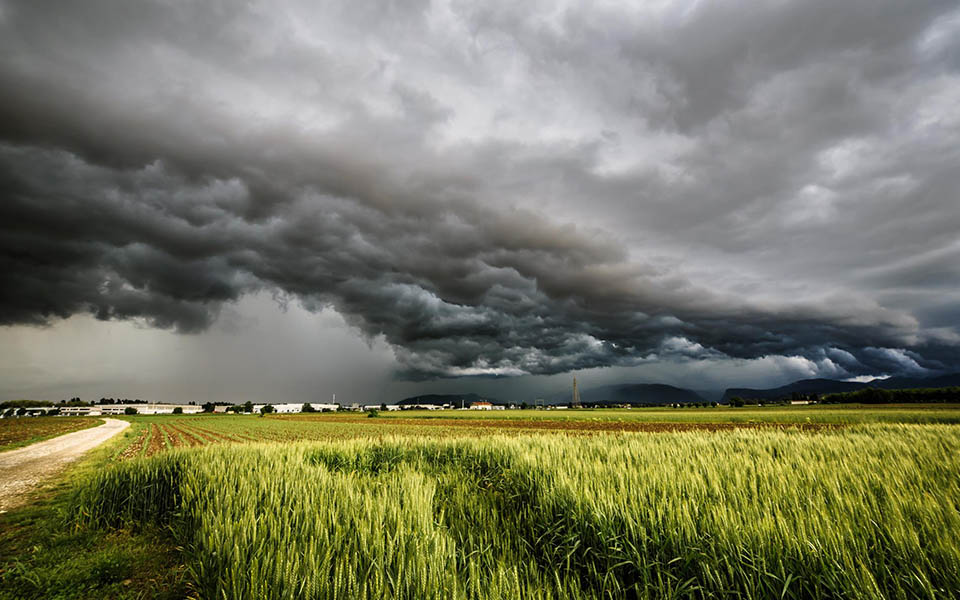Extreme weather events (e.g., hurricanes, tornadoes, hailstorms, wildfires) continue to demand attention due to their escalating devastation and associated costs. These events, affecting organizations nationwide, prompt a closer examination of their implications.
2024 Extreme Weather Events Recap
Extreme weather events (e.g., hurricanes, tornadoes, hailstorms, wildfires) are becoming more frequent and devastating, placing significant financial strain on businesses. According to the National Oceanic and Atmospheric Administration (NOAA), the U.S. experienced 24 weather and climate disasters in 2024, each causing losses exceeding $1 billion.
These events included 17 severe storms, four hurricanes, one wildfire and two winter storms. The frequency and intensity of these disasters highlight the increasing threat extreme weather poses on businesses and communities.
Historic Losses
Severe Storms
Severe storms have been a primary driver of losses. In the U.S., convective storms (e.g., tornadoes, hailstorms, straight-line winds) caused over $30 billion in insurance claims in 2024. Globally, severe thunderstorms in the first half of 2024 caused $42 billion in damages — 87% above the 10-year average. In 2025, the Los Angeles wildfires have caused unprecedented damage, with insured losses estimated up to $30 billion, potentially the costliest wildfire in U.S. history.
Hurricanes
A category 4 storm, Hurricane Helene made landfall in Florida’s Big Bend region, becoming the strongest hurricane to ever strike the area, causing widespread flooding and power outages for millions and claiming over 90 lives. Its path stretched 600 miles inland, affecting nearly 162,000 commercial properties valued at $425.9 billion.
Weeks later, Hurricane Milton struck Florida as a category 3 storm, with winds exceeding 120 mph. Milton’s storm surge and inland flooding compounded the devastation, hitting areas still recovering from Helene. Combined, insured losses are estimated between $35 billion and $55 billion.
Preparing for a New Normal
Experts warn that extreme weather is becoming more frequent and severe. Amid this new normal, the insurance industry is adapting by prioritizing weather preparedness and proactive risk management to address rising weather-related losses.
Tips to Protect Your Business from Extreme Weather Events
Properly preparing for natural disasters is essential for employee wellbeing, protection of assets and uninterrupted business operations. Use these suggestions to effectively prepare your business for natural disasters:
- Create a comprehensive disaster management strategy. Formulate a disaster preparedness and response plan that is tailored to your company’s unique needs and location. Identify potential natural disasters that may pose a threat to your area (e.g., hurricanes, earthquakes, floods, wildfires, tornadoes) and determine their probability and impact.
- Organize an emergency response team. Establish and train a well-organized team that’s accountable for executing a disaster plan. Ensure each team member is fully aware of their respective roles and responsibilities during crises.
- Prioritize employee safety. Ensure employee safety remains a top priority by offering comprehensive training on disaster preparedness and first aid. Establish a robust system that allows for the monitoring of employees’ whereabouts during an emergency.
- Build a communication plan. Create a robust communication strategy to effectively notify employees, customers, vendors and stakeholders in the event of a disaster. Emphasize the importance of utilizing redundant communication channels (e.g., backup power sources) to prevent interruptions of information distribution.
- Protect your data. Regularly back up crucial data and securely store it offsite or in a reliable cloud platform. Establish and enforce disaster recovery protocols to reinstate essential IT systems and data.
- Ensure facilities are secure. Implement measures to retrofit buildings, enabling them to withstand various potential disasters (e.g., earthquakes, hurricanes). Some recommended measures include:
- Obtain proper insurance coverage. Perform a comprehensive evaluation of your insurance policies to ensure sufficient protection from various natural disasters. Familiarize yourself with the specific limitations, deductibles and exclusions outlined in your policy.
Want to dive deeper into the P&C market trends shaping your business in 2025? Download our comprehensive P&C Market Outlook today to stay ahead of emerging risks and evolving coverage options
We’re Here to Help You Weather the Storm
Facing escalating weather-related challenges, the need for strategic preparedness has never been more critical. Following a year of relentless extreme weather events in 2024, the impact on businesses is undeniable. Organizations must embrace a new norm where proactive weather preparedness is not just a strategy but a necessity. Connect with a member of our team for additional guidance to mitigate your risk.
© Copyright CBIZ, Inc. All rights reserved. Use of the material contained herein without the express written consent of the firms is prohibited by law. This publication is distributed with the understanding that CBIZ is not rendering legal, accounting or other professional advice. The reader is advised to contact a tax professional prior to taking any action based upon this information. CBIZ assumes no liability whatsoever in connection with the use of this information and assumes no obligation to inform the reader of any changes in tax laws or other factors that could affect the information contained herein. Material contained in this publication is informational and promotional in nature and not intended to be specific financial, tax or consulting advice. Readers are advised to seek professional consultation regarding circumstances affecting their organization.
“CBIZ” is the brand name under which CBIZ CPAs P.C. and CBIZ, Inc. and its subsidiaries, including CBIZ Advisors, LLC, provide professional services. CBIZ CPAs P.C. and CBIZ, Inc. (and its subsidiaries) practice as an alternative practice structure in accordance with the AICPA Code of Professional Conduct and applicable law, regulations, and professional standards. CBIZ CPAs P.C. is a licensed independent CPA firm that provides attest services to its clients. CBIZ, Inc. and its subsidiary entities provide tax, advisory, and consulting services to their clients. CBIZ, Inc. and its subsidiary entities are not licensed CPA firms and, therefore, cannot provide attest services.
